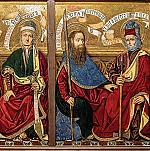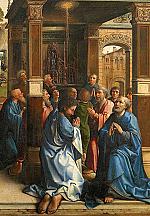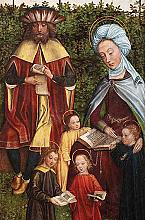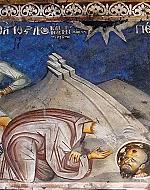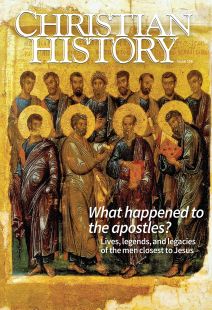Doubting no more
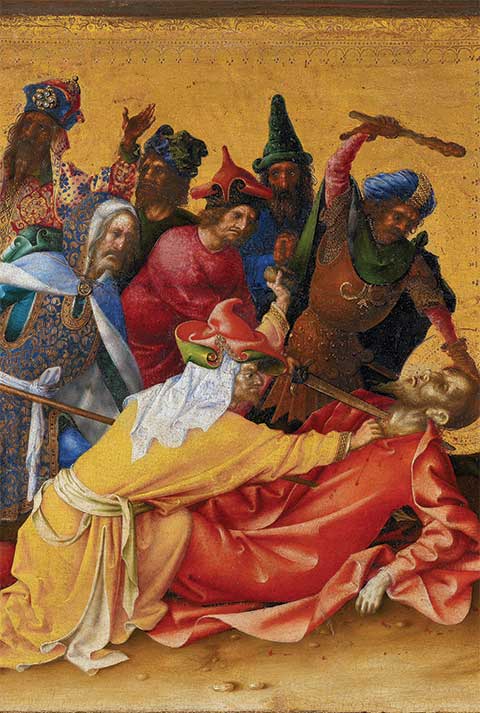
[ABOVE: Stefan Lochner, Detail, Martyrdom of Saint Thomas from Martyrdom of the Apostles. after 1435. Painting on Nutwood—Städel Museum / Public domain, Wikimedia]
The Acts of Thomas, an extrabiblical text dating back to the third century, narrates the events of Thomas’s evangelistic efforts. Much of what exists today was a part of church oral tradition, though various versions incorporate creative elaborations. This excerpt narrates the legend of Thomas’s martyrdom.
King Misdaeus considered how he would put the Apostle Thomas to death, but he was afraid because many people were following him, including many nobles and those in authority who believed in him. Therefore, Misdaeus took Thomas and went out of the city, and armed soldiers also went with him. The people supposed that the king desired to learn something from him, so they stood still and watched. And when Misdaeus, Thomas, and the soldiers had walked one mile, the king delivered Thomas to four soldiers and an officer and commanded them to take him to the mountain, where they should pierce him with spears and put an end to him and then return to the city. . . .
Then some men ran after Thomas, desiring to deliver him from death. But two soldiers were on the right hand of the apostle, and two on his left, holding spears, and the officer held Thomas’s hand and guarded him. Then the Apostle Thomas said, “O the hidden mysteries which are accomplished in us even until our death! O riches of his glory, who will not suffer us to be swallowed up in this passion of the body! Four are they that cast me down, for of four parts am I made [meaning unknown, though could possibly refer to four humors]; and one is he that draws me, for by one I am made, and unto him I go. And this I now understand: that my Lord and God Jesus Christ, being of one was pierced by one, but I, who am of four, am pierced by four.”
LOVING HIS ENEMIES
And when the Apostle Thomas went up the mountain to the place where he was to be slain, he said unto them that held him and to the rest, “Brethren, hearken unto me now at the last, for I am come to my departure out of the body. Let not then the eyes of your heart be blinded, nor your ears be made deaf. Believe on the God whom I preach and be not guides unto yourselves in the hardness of your heart. Instead, walk in all your liberty, and in the glory that is toward man, and the life that is toward God. . . .”
And the blessed Thomas went to pray and kneeled down and rose up and stretched forth his hands unto heaven. . . .
And when he had thus prayed, he said unto the soldiers, “Come here and accomplish the commandments of the one who sent you.” And the four came and pierced him with their spears, and he fell down and died.
And all the brethren wept. Then they brought beautiful robes and much fair linen and buried him in a royal sepulcher where former kings had been laid.
But his disciples would not go down to the city but continued sitting by him all day. Then the Apostle Thomas appeared to them and said, “Why do you sit here and keep watch over me? I am not here, but I have gone up and received all that was promised to me. Rise up and go down! For after a little time, you also will be gathered unto me.”
By Anonymous
[Christian History originally published this article in Christian History Issue #156 in 2025]
Acts of Thomas (164–169), adapted by Rex D. Butler from The Apocryphal New Testament, translated by M. R. James (1924)Next articles
Courage, zeal, and faithfulness
Accounts of Judas Thaddeus, Simon the Zealot, and Matthias help explain the Gospel’s far reach
Rex D. Butler



